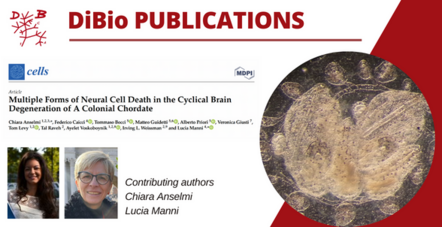
New Publication - Multiple Forms of Neural Cell Death in the Cyclical Brain Degeneration of A Colonial Chordate
Pubblicato il: 11.04.2023 13:13
Multiple Forms of Neural Cell Death in the Cyclical Brain Degeneration of A Colonial Chordate
Human neuronal loss associated with neurodegenerative diseases occurs through different cellular mechanisms, mainly studied in vitro because of animal anatomical complexity. However, in the paper Multiple forms of neural cell death in the cyclical brain degeneration of a colonial chordate, published in the journal cells (https://doi.org/10.3390/cells12071041), the authors characterized the neuronal death in Botryllus schlosseri, a simple marine colonial tunicate. This organism shares substantial genomic homology with mammals and has a life history in which controlled neurodegeneration happens simultaneously in the brains of adult zooids during a cyclical phase named takeover. The research was coordinated by Chiara Anselmi (PhD at DiBio UNIPD, now post-doc at Stanford University), Lucia Manni (together with Federico Caicci and Veronica Giusti, DiBio, UNIPD), and collaborators of University of Milan and Stanford. Using an ultrastructural and transcriptomic approach, the authors showed that multiple neuronal death forms, namely apoptosis, necrosis and autophagy, characterize neurodegeneration in B. schlosseri. They also found that neurodegeneration exhibits a cell-to-cell, prion-like propagation recalling the conformational disorders typical of some human neurodegenerative pathologies. Therefore, B. schlosseri, exhibiting a repeated degeneration program, may yield mechanistic insights relevant to the study of neurodegenerative diseases.





